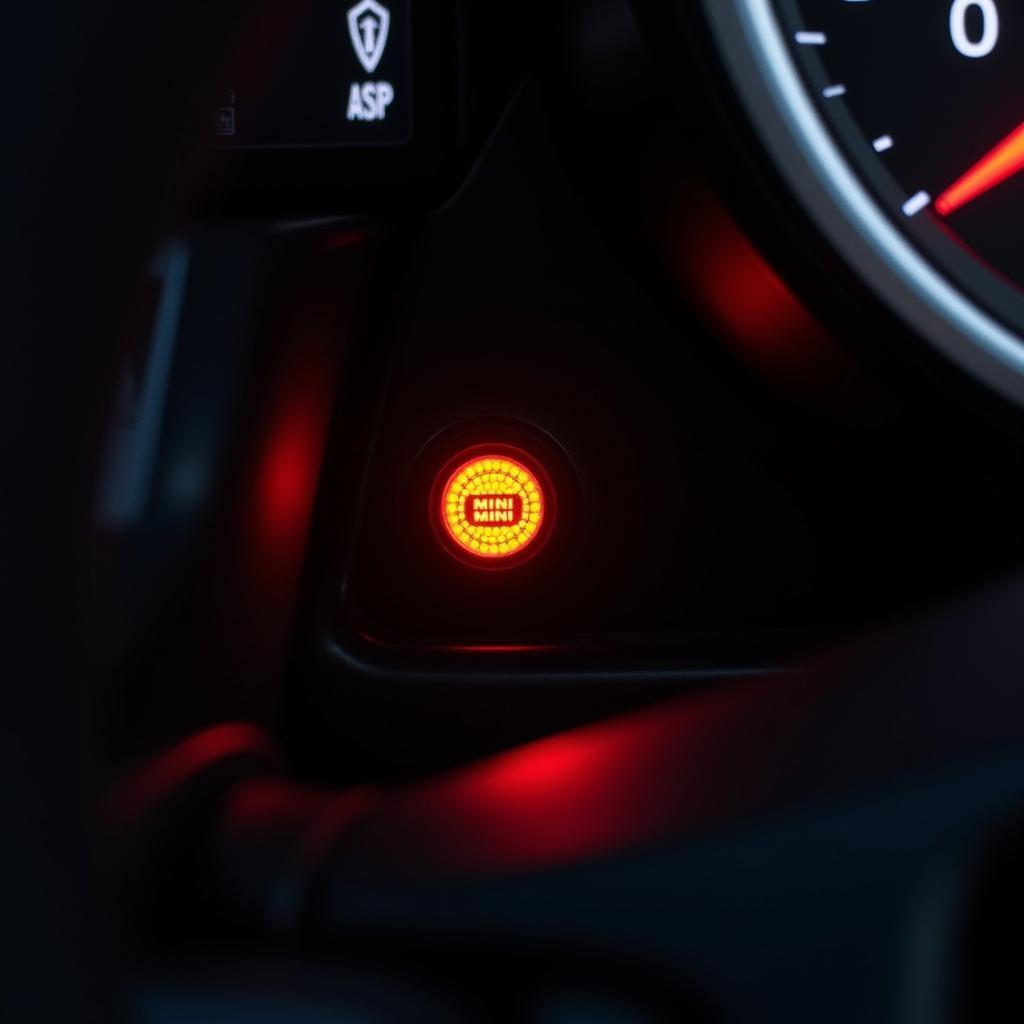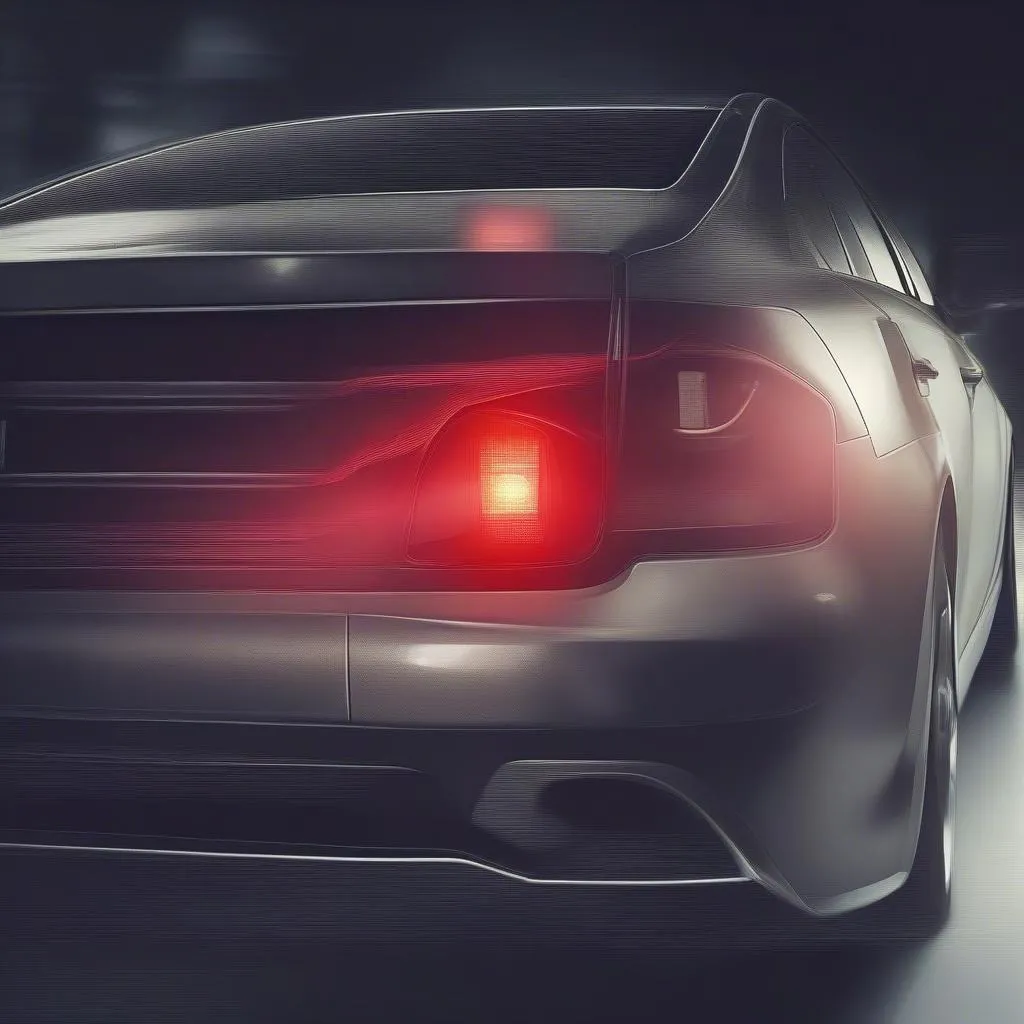The dreaded mini brake warning light. It illuminates your dashboard, a constant reminder that something isn’t quite right. And what’s worse? Sometimes, even after addressing the apparent issue, the mini brake warning light won’t reset. This comprehensive guide dives into the common causes, diagnostic techniques, and solutions for a stubborn mini brake warning light that refuses to go away.
Understanding the Mini Brake Warning Light
The mini brake warning light, often symbolized by an exclamation point within a circle or parentheses, can indicate several issues, primarily related to your braking system. It’s crucial to distinguish it from the regular parking brake light, which typically looks like a “P” within a circle. While a stuck parking brake is a common reason for the mini brake warning light, it’s not the only culprit. Low brake fluid, faulty sensors, and even electrical glitches can trigger this warning.
Common Causes of a Persistent Mini Brake Warning Light
Several factors can contribute to a mini brake warning light that refuses to turn off, even after the initial problem seems resolved.
-
Low Brake Fluid: This is the most frequent culprit. A leak in the brake lines, worn brake pads, or a failing master cylinder can deplete brake fluid levels, triggering the warning light. Topping off the fluid is a temporary fix; locating and repairing the leak is crucial.
-
Faulty Brake Pad Wear Sensors: Many modern vehicles have sensors embedded within the brake pads. When the pads wear down to a certain point, these sensors trigger the warning light. Even after replacing the brake pads, a damaged or improperly installed sensor can keep the light on.
-
Malfunctioning ABS System: Issues within the Anti-lock Braking System (ABS), such as a faulty wheel speed sensor or a problem with the ABS module itself, can illuminate the mini brake warning light.
-
Electrical Issues: Wiring problems, corroded connectors, or a failing brake light switch can also cause the warning light to stay on.
 Mini brake warning light illuminated on a car dashboard
Mini brake warning light illuminated on a car dashboard
Diagnosing the Problem: A Step-by-Step Approach
-
Check the Brake Fluid Level: Open the hood and locate the brake fluid reservoir. Check the fluid level against the minimum and maximum markings. If it’s low, top it off and monitor it closely for further drops.
-
Inspect the Brake Pads: Visually inspect the brake pads for wear. If they’re thin, they likely need replacement. Also, check the brake pad wear sensors for damage or improper installation.
-
Scan for Diagnostic Trouble Codes (DTCs): Use an OBD-II scanner to retrieve any stored DTCs related to the braking system. These codes can provide valuable clues about the specific issue.
-
Check the Parking Brake: Ensure the parking brake is fully released. Sometimes, a slightly engaged parking brake can trigger the warning light.
-
Inspect Wiring and Connectors: Visually inspect the wiring and connectors related to the braking system for any signs of damage, corrosion, or loose connections.
Resetting the Mini Brake Warning Light
Once you’ve identified and addressed the underlying issue, you may need to manually reset the mini brake warning light. This can often be achieved by disconnecting the car’s battery for a few minutes or using an OBD-II scanner to clear the DTCs. In some cases, the light may reset automatically after driving a short distance.
Remote Diagnostics and Software Solutions
In some instances, resolving a persistent mini brake warning light might require specialized diagnostic software and programming. Remote diagnostics and software installations, performed by qualified technicians, can offer a convenient and effective solution. This involves connecting your vehicle to a remote diagnostic system, allowing technicians to analyze data, identify the root cause, and even reprogram certain modules to rectify the issue.
“Remote diagnostics is becoming increasingly important in modern vehicle repair,” says John Smith, Lead Automotive Diagnostic Technician at Advanced Auto Solutions. “It allows us to quickly and accurately diagnose complex issues, even from a distance, saving time and money for our customers.”
Preventing Future Issues
Regular brake inspections and maintenance are crucial for preventing future problems. This includes checking brake fluid levels, inspecting brake pads and rotors, and ensuring all components are in good working order.
“Preventive maintenance is the best way to avoid costly repairs down the line,” adds Jane Doe, Senior Automotive Technician at Expert Auto Repair. “Regular brake checks are a small investment that can save you a lot of trouble in the long run.”
Conclusion
A mini brake warning light that won’t reset can be frustrating, but by understanding the potential causes and following a systematic diagnostic approach, you can pinpoint the problem and get back on the road safely. Remember, if you’re unsure about any step, consulting a qualified technician is always recommended. Addressing the mini brake warning light promptly ensures the safety and reliability of your vehicle’s braking system.
FAQ
- What does the mini brake warning light mean? It indicates a potential issue with your braking system, such as low brake fluid or worn brake pads.
- Why won’t my mini brake warning light reset? Even after fixing the initial problem, a faulty sensor, electrical issue, or the need for a manual reset can prevent the light from turning off.
- How do I reset the mini brake warning light? This can often be done by disconnecting the battery or using an OBD-II scanner to clear DTCs.
- Can I drive with the mini brake warning light on? It’s not recommended. The light indicates a potential safety issue that should be addressed immediately.
- What should I do if I can’t fix the problem myself? Consult a qualified technician for professional diagnosis and repair.
- How can I prevent the mini brake warning light from coming on in the future? Regular brake inspections and maintenance are essential for preventing future issues.
- Is remote diagnostics an option for fixing this issue? Yes, in some cases, remote diagnostics and software solutions can effectively address the problem.

